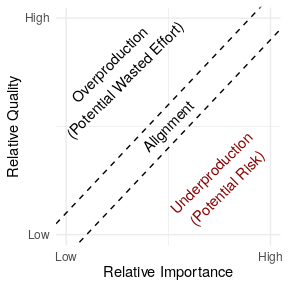| Line 21: | Line 21: | ||
== Event Details == | == Event Details == | ||
Attendees will include an invited group of 20 | Attendees will include an invited group of 20 leaders, practitioners, researchers, and funders from communities and industry. The agenda will include a small number of short research presentations to help frame our discussion but devote the majority of our time together to dialogue. | ||
Discussions will be held under Chatham House Rule. Any presentations will be recorded and shared publicly but discussions will not. | Discussions will be held under Chatham House Rule. Any presentations will be recorded and shared publicly but discussions will not. | ||
Latest revision as of 15:47, 15 December 2023
Science of Community Dialogue: Aligning Contributor Effort with Community Need[edit]
- What
- Dialogue on Aligning Contributor Effort with Community Need in the Community Data Science Collective's Science of Community Dialogue Series
- When
- December 15, 2023 9:00am-3:00pm (with an optional dinner at 6:00pm on December 14)
- Where
- Center for Information Technology Policy, 3rd Floor on Sherrerd Hall, Princeton University, Princeton, New Jersey
- Who
- Attendance at this event is by invitation only.
- Organizers
- Benjamin Mako Hill, Aaron Shaw, Kaylea Champion
- Hosts
- Community Data Science Collective and Princeton University Center for Information Technology Policy
Imagine if we lined up every piece of open source software in terms of how important it was. Now imagine that we also lined them up in terms of their quality or the share of developer attention given to each piece of software's upkeep. Wouldn't it be great if the two things were strongly aligned so that the most important stuff was also the highest quality? Research has shown that in the case of open source software and Wikipedia, this is frequently not the case.
When they're functioning well, markets can work to "align" supply with demand through price changes. In many online communities, participants choose their tasks based on their own interests. As a result, information artifacts produced by online communities is often underproduced in the sense that their quality is much less than we might imagine, given their importance. This dialogue session will be devoted to exploring the dynamics behind underproduction—a d discussing how community managers can more effectively manage these processes.
This event is organized by the CDSC and hosted and supported by the Princeton Center for Information Technology Policy. It is paid for, in part, by a National Science Foundation grant (IIS-2045055) so that it will be held at no cost to attendees.
Event Details[edit]
Attendees will include an invited group of 20 leaders, practitioners, researchers, and funders from communities and industry. The agenda will include a small number of short research presentations to help frame our discussion but devote the majority of our time together to dialogue.
Discussions will be held under Chatham House Rule. Any presentations will be recorded and shared publicly but discussions will not.
What is the Science of Community Dialogue Series?[edit]
The Science of Community Dialogue Series is a series of conversations between researchers, experts, community organizers, and others interested in how communities work, collaborate, and succeed. You can watch this short introduction video with Aaron Shaw.
What is the CDSC?[edit]
The Community Data Science Collective (CDSC) is an interdisciplinary research group made of up of faculty and students at the University of Washington Department of Communication, the Northwestern University Department of Communication Studies, the Carleton College Computer Science Department, and the Purdue University School of Communication.
Learn more[edit]
If you'd like to learn more or get future updates about the Science of Community Dialogues, please join the low volume announcement list.
Feel free to contact Benjamin Mako Hill or one of the other organizers if you have any questions about the event.
Financial Support[edit]
This work is being supported by the US National Science Foundation (award IIS-2045055) and by Princeton Center for Information Technology Policy.

